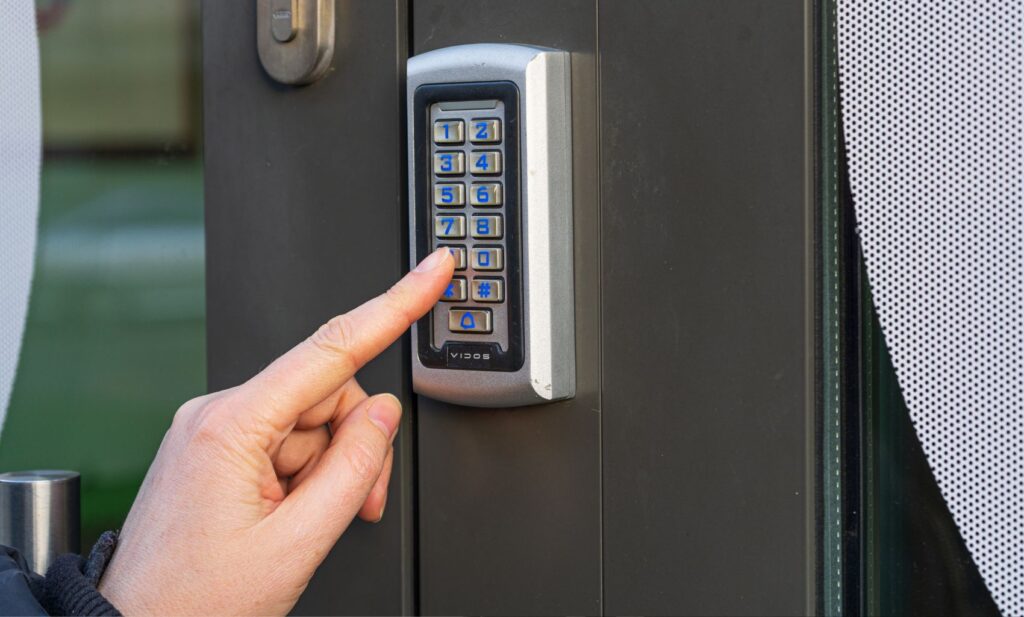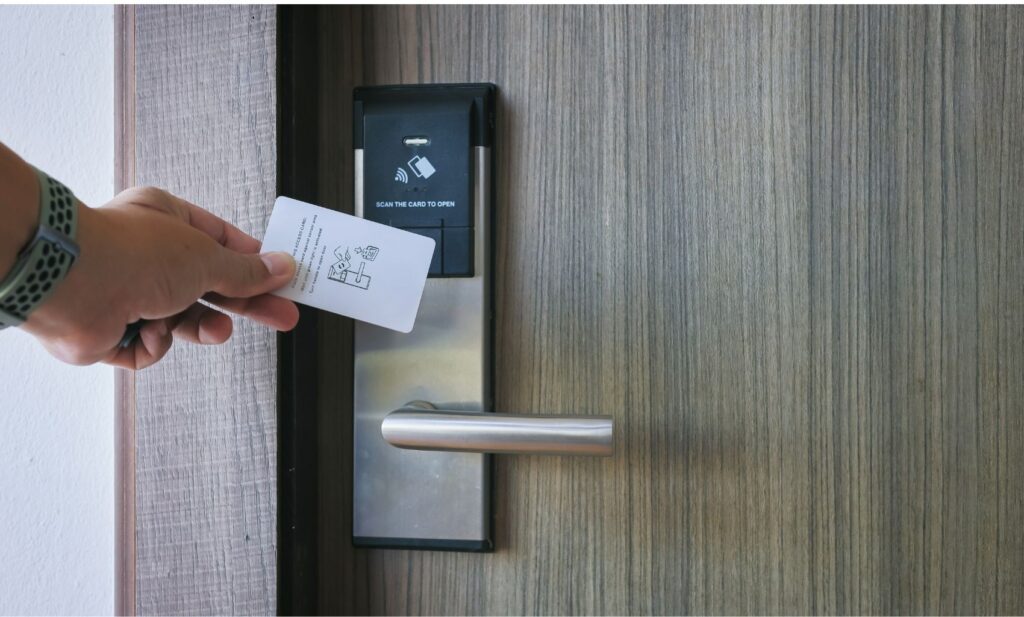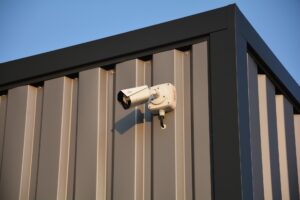In today’s rapidly advancing world, safeguarding our homes and businesses has become more crucial than ever. Traditional lock-and-key mechanisms are increasingly being replaced by sophisticated door entry systems that not only bolster security but also streamline access for authorised individuals. This article delves into the intricacies of door entry systems, exploring their functionalities, benefits, and the pivotal role they play in modern security solutions.
Key Takeaways
- Enhanced Security: Door entry systems provide robust protection against unauthorised access, significantly reducing security breaches.
- Simplified Access: These systems offer convenient entry methods for authorised users, eliminating the need for traditional keys.
- Versatility: Suitable for both residential and commercial properties, door entry systems can be customised to meet specific security needs.
- Integration Capabilities: They can seamlessly integrate with other security measures, such as surveillance cameras and alarm systems, for comprehensive protection.
- Remote Management: Many modern door entry systems allow for remote monitoring and control, providing flexibility and peace of mind.

Overview
A door entry system is an electronic security solution designed to control and monitor access to a building or specific areas within it. By utilising various authentication methods—such as keycards, PIN codes, biometric scans, or mobile applications—these systems ensure that only authorised individuals can gain entry. This approach not only enhances security but also simplifies access management, making it easier to grant or revoke permissions as needed.
What is a Door Entry System?
At its core, a door entry system replaces traditional mechanical locks with advanced electronic controls. Unlike standard locks, which can be easily picked or duplicated, door entry systems use more secure methods of authentication. For example, a biometric system might use fingerprint recognition to allow access, ensuring that only the person with the correct biometric data can enter. This technology provides a significant upgrade in security, making unauthorised access far more challenging.
The Importance of Door Entry Systems for Enhanced Security
One of the most significant advantages of door entry systems is their ability to dramatically improve the security of a property. Traditional locks can be picked, keys can be copied, and physical security breaches can go unnoticed. In contrast, door entry systems provide robust defences by requiring unique credentials—whether in the form of codes, cards, biometrics, or mobile authentication.
These systems are particularly effective in environments where sensitive data or valuable assets are stored, such as offices, warehouses, or data centres. By installing a door entry system, businesses and homeowners alike can mitigate the risk of theft, vandalism, and other security breaches.
For example, a biometric system that scans fingerprints ensures that only those registered in the system can enter the premises. Even if an intruder obtains a user’s personal belongings, without their biometric data, access remains securely blocked. This makes door entry systems a vital component in any comprehensive security strategy.
Types of Door Entry Systems
- Keypad Entry Systems: Users enter a unique PIN code to gain access. While straightforward, the security level depends on the complexity and confidentiality of the code.
- Card-Based Systems: Utilising RFID or magnetic stripe cards, these systems allow users to swipe or tap their card against a reader to unlock doors. They are widely used in office environments.
- Biometric Systems: Employing fingerprint, facial recognition, or retina scans, these systems offer high security by verifying unique biological traits.
- Mobile-Based Systems: Leveraging smartphones, users can access doors via Bluetooth, NFC, or dedicated applications, providing convenience and flexibility.

Benefits of Implementing Door Entry Systems
- Enhanced Security: By restricting access to authorised individuals, these systems significantly reduce the risk of unauthorised entry and potential security breaches.
- Convenience: Eliminating the need for physical keys, users can access premises using cards, codes, or biometric data, streamlining the entry process.
- Access Monitoring: Many systems maintain logs of entry and exit times, aiding in monitoring and auditing access patterns.
- Remote Management: Advanced systems offer remote access capabilities, allowing administrators to manage permissions and monitor access from anywhere.
Considerations for Choosing a Door Entry System
When selecting a door entry system, it’s essential to assess your specific security needs, the size and layout of your property, and the desired level of convenience. Factors to consider include:
- Authentication Method: Choose between PIN codes, cards, biometrics, or mobile access based on your security requirements and user preferences.
- Integration: Ensure the system can integrate with existing security measures, such as surveillance cameras or alarm systems, for a cohesive security strategy.
For expert advice and reliable installation of advanced door entry systems, visit Ai-Security at Vigilant House, 1155 London Rd., Leigh-on-Sea, SS9 3JE, or call 01702 476700 to get started with tailored security solutions for your needs.
Conclusion
In an age where security is paramount, door entry systems provide a blend of robust protection and user-friendly access management, making them ideal for homes and businesses alike. With options ranging from biometric verification to mobile-based access, these systems cater to various security needs while offering the convenience that traditional locks lack.
Explore the advantages of these systems and make a choice that elevates both security and simplicity. For those considering this leap into enhanced security, understanding “what is a door entry system” is the first step—contact Ai-Security today to discuss how we can support your unique security requirements.
FAQs
Q: What is a door entry system?
A: A door entry system is an electronic security solution that controls and monitors access to buildings using authentication methods like PIN codes, keycards, biometrics, or mobile access.
Q: How secure are biometric door entry systems?
A: Biometric systems offer high security by verifying unique biological traits, making them highly reliable for preventing unauthorised access.
Q: Can door entry systems be integrated with existing security setups?
A: Yes, many systems are designed to work with surveillance cameras, alarms, and other security measures for comprehensive protection.
Q: Can I control a door entry system remotely?
A: Yes, many modern door entry systems include remote control options, allowing access through a smartphone app or web-based platform.
through a smartphone app or web-based platform.
Q: Are door entry systems secure from hacking?
A: Professionally installed systems are highly secure, utilising encryption and regular updates to prevent unauthorised access. DIY systems may lack such safeguards.
Q: How does a door entry system differ from traditional locks?
A: Unlike traditional locks, door entry systems offer electronic or digital control, keyless entry options, and often include features like video monitoring and remote access.
Q: What are the maintenance requirements for a door entry system?
A: Maintenance is minimal but essential for optimal performance. Regular checks, software updates, and occasional inspections by professionals help keep systems secure and reliable.












